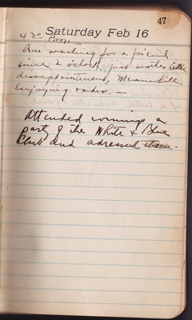
12:10 P.M.
The radio afforded me the
opportunity to hear the adress
of Pres. Coolidge, delivered at the
Waldorf Astoria. It was a
masterpiece, He is for tax reduction
against a bonus, and the way I
understood it he made an overture
for the European Nations for another
conference for still more disarmament.
He is for National economy.
He states that the 3 Americans that
are in Europe conferring about the
present situation, are not the repre-
sentatives of the government, but they
have with them the mind of the Am.
people. He outlined his attitude
toward Mexico.
Although I do not fully agree with
him, he won for his simplicity and
frankness my highest admiration
tonight.
———–
Matt’s Notes:
Coolidge’s Lincoln Day Dinner address at the Waldorf-Astoria was his first appearance in New York, his first national address, and, as the the New York Times noted, “was generally considered as the first utterance in his campaign for election to the Presidency…” Presidential radio appearances were still novel at the time; I think the way Papa introduces his recap of the broadcast (“the radio afforded the the opportunity to hear the address…”) shows how unaccustomed he was to such a privilege. Similarly, the Times devoted a few paragraphs to the logistics of the broadcast (“atmospheric conditions were splendid”) and assorted snafus (apparently the broadcast crossed wires a few times with a broadcast by the China Society).
I’m tempted to kid myself into pining for a long-lost America whose airwaves weren’t befouled by political dross, but Coolidge’s speech betrays signs of the approaching darkness. In it, Coolidge tries to contain the Teapot Dome scandal, which he inherited from Harding and centered on the illicit relationships between Cabinet members and oil companies; defended his plan to give tax breaks to corporations and wealthy Americans, even though he said the government could not afford bonuses for the military (something about how soldiers had fought WWI for principles, not money); and gave a lukewarm nod toward world disarmament while pitching an arms sale to Mexico.
It’s hard for me not to cringe at Coolidge’s speech because it reminds me so much of the crap Dubya spews, but even factoring that in I find Papa’s kind assessment of such a non-progressive speech incongruous (the New York Times’ transcript is here; subscription required). Still, it’s not incomprehensible for a few reasons. First, as I’ve noted before, Papa inherently expected the best from people and had a remarkable ability to look kindly on their flaws; why wouldn’t this apply to Presidents as well? Second, the mere excitement over hearing the President on the radio may have predisposed him toward what he heard. Third, Woodrow Wilson, who I think Papa was particularly attached to, had died nine days earlier; maybe Papa just needed to be won over, to feel the “highest admiration” for a President once again and get back a little of what he’d lost.
In any event, now seems like a good time to share this photograph of Papa listening to his radio. Maybe this is what he looked like when he heard the Coolidge speech:






